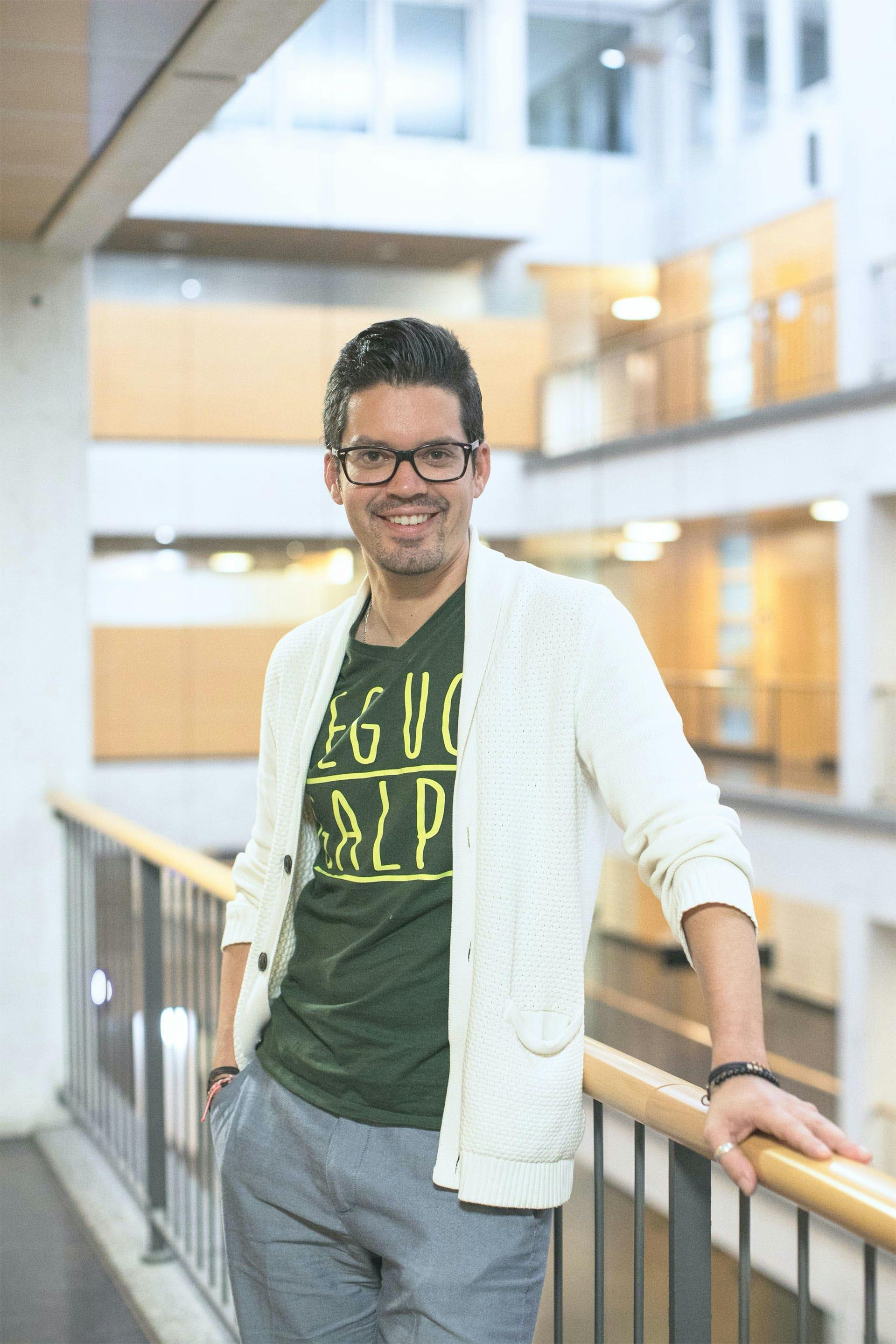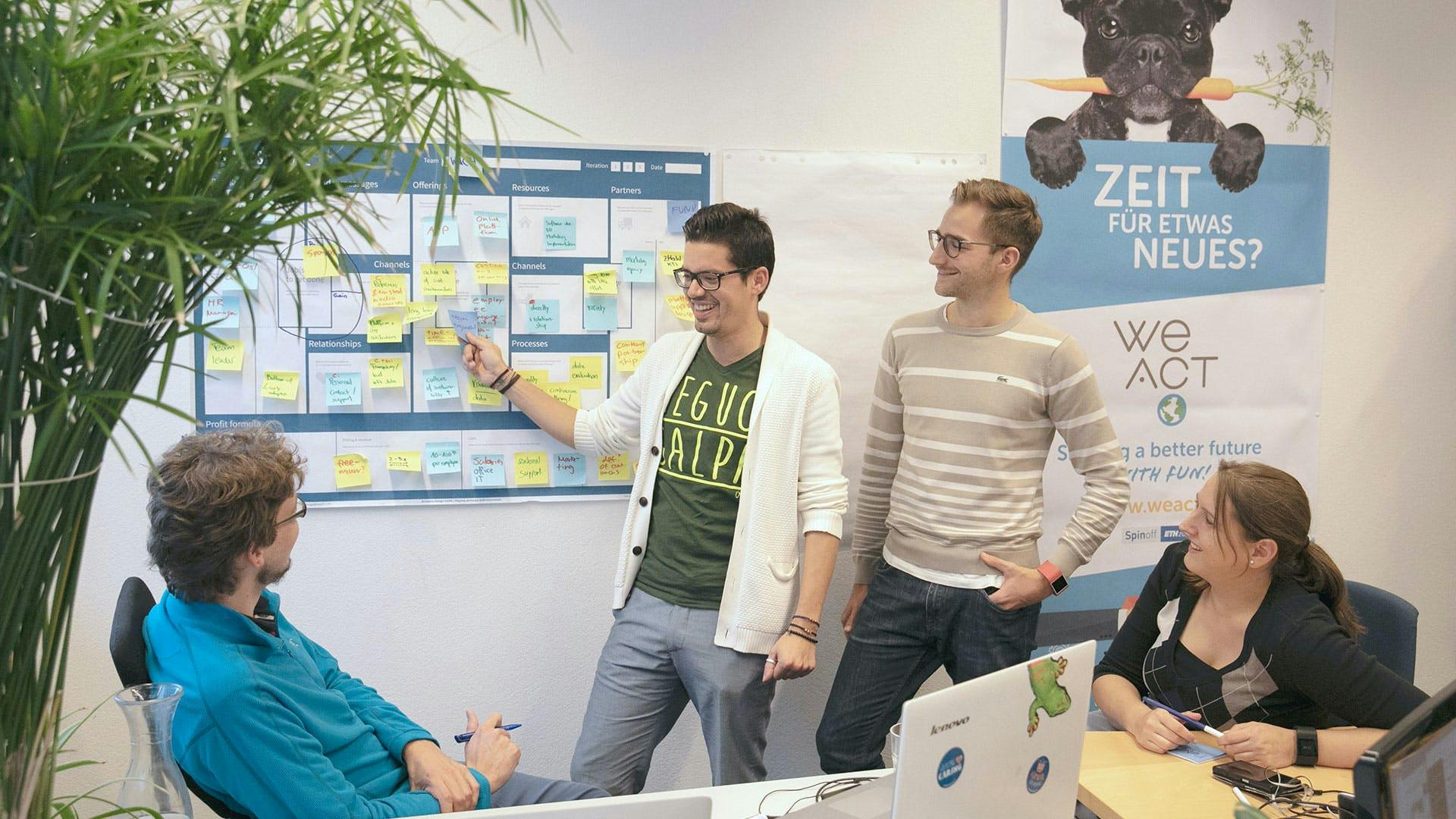"Not just profit-driven": Meet the Swiss founder cultivating healthier corporate cultures
fter getting a taste of Zürich’s corporate culture, Christian Kaufmann side-stepped into the city’s startup scene. This was where he cofounded WeAct, a platform designed to help companies create fun and engaging sustainability and health programs.
Christian Kaufmann grew up around the world, living in the United Arab Emirates, Honduras, Spain, the US, Greece and Chile, in addition to his native Switzerland.
After completing his bachelor’s degree in business administration in Greece, Christian moved back to Zürich to launch his career. He quickly realized, however, that the corporate world was not for him.
It wasn’t until he joined a master’s program at the University of Lausanne, where he took a class in social entrepreneurship, that he made an important discovery: not all businesses have to focus solely on profit and adhere to a rigid working culture. With a committed team and a flexible environment, he says, companies can also create sustainable solutions to problems posed by society.
Christian joined WeAct in 2012, where Majka Baur and Prisca Müller (now his cofounders), had already been trialing their idea with students at ETH Zürich, a STEM university in the Swiss city. Today, their mission is to help companies cultivate a healthier corporate culture and encourage employees to adopt more sustainable lifestyles.

Christian Kaufmann, cofounder of WeAct. Photo: Startup Guide
You've lived in quite a few places. Why did your family travel so much?
It was mainly because of my father's work. He's a project manager at a company called Rheinmetall, which is a defense contractor.
Whenever the company has a project with a foreign government, they normally have a knowledge transfer; my father is the liaison between both entities. We’d go to the host country for the duration of the project, normally three to five years, return to Switzerland in between, and then move again.
After being born in Switzerland, I spent the first four years in Abu Dhabi. My kindergarten time I spent in a small town in Switzerland called Aarburg, then I went back to Abu Dhabi to finish primary school.
Then we went for one year to Honduras, where my mother is actually from. I finished high school in San Sebastian, in Basque Country in Spain, and did my studies in the US, Greece, Switzerland and Chile.
What kind of work did you do before you started working with WeAct?
After I finished my bachelor's degree in Greece in business administration, I spent six months working for Apple computers, in an IT support call center. That was one of my first professional experiences.
Then I returned to Zürich and got an opportunity to work for Credit Suisse in Zürich as a junior client manager in the Employee Stock Options Services. It was my second big experience in the corporate world, and I realized it wasn't right for me: it was very hierarchical, very structured, more based on a numbers-only approach.
I worked there for nine months, and I didn't enjoy it very much. I felt that it was very restrictive. Everyone had a suit and tie on every day, and it just didn't feel like the kind of environment I wanted to work in. It actually made me not want to work in a traditional company at all.
There was this formal and constricting culture which was very uninspiring. There are thousands of employees working in so many divisions and departments, each one in their own little bubble where you have a limited view of the global picture and even less sense of truly contributing to making a difference.
So I started thinking about careers that were more in line with my values and my way of working, so to speak.
I did a few other jobs after that, mainly in consulting, but in all my work experience, this profit-driven mindset didn't really appeal to me, and nor did the traditional hierarchy structure. I’d always had a problem following orders just for the sake of following orders.
Was there a sort of last straw?
It was a combination of things. After working for two years, I realized a business degree from Greece was preventing me from advancing in the business world, so I decided to do a master's degree at the University of Lausanne.
During that time, I took a social entrepreneurship class, which was one of the best classes I’ve ever taken.
The class had a theoretical part that taught us about this new business approach to solving societal and environmental problems, but at the same time it had a practical part which was set up as a team competition among the participating students to help a future social startup, jobfactory, develop various areas of its business, with the winner getting a $10,000 prize to implement the project.
My team and I won the competition, and for the first time I was really captivated by the idea of working for something that was not just profit-driven but also trying to create a sustainable solution to a problem in society.
It was an eye-opener for me to see how companies don't have to all be corporate-driven – that they can also solve problems with more flexible, innovative structures.
How did you have the idea for WeAct? How'd the company get started?
I joined WeAct in 2012, but the idea actually started in 2010 with two people, Majka Baur and Prisca Müller, the two other cofounders who attended the Ecoworkshop at ETH, a technical university in Zürich, where the main goal was to find innovative ideas to reduce CO2 emissions on campus.
I was really captivated by the idea of working for something that was not just profit-driven but also trying to create a sustainable solution to a problem in society.
Instead of thinking of new technology that would solve the problem, they focused on how to motivate people to use the existing solutions. They wanted to find ways to get people to undertake daily actions that have a positive environmental impact, and so the WeAct Challenge was born.
They won this competition and received some money with which they created the first WeAct Association, and they started implementing their idea with the students on campus. They did this for two years – 2010 and 2011 – and after graduating in 2012, they decided to transition it from a student project into a social startup.
They began defining the business model around it and started looking for a person with a business background who could help them with the value proposition and customer acquisition.
This was at the end of my master's program in the fall of 2012. We got to know each other, and I started working with them on a trial basis for a month without getting paid. We clicked so well that I became part of the team. Then, a year and a half later in March 2014, we decided to incorporate and switch from an association to an LLC.
How has this been different from the corporate world?
One of the negative things about working at a social startup is that there’s normally not that much funding. That means you have to get by with a much lower income, at least much lower than you'd be paid in the corporate world.
But that also leads to one of the positives: the people who work here are very, very purpose-driven.
One of the negative things about working at a social startup is that there’s normally not that much funding.
Everyone who works at a social startup is really committed to the purpose you're trying to achieve. In our case, it's about creating a society that's more in harmony with the environment, where everyone has the ecological footprint of one person rather than three people.
With such a committed team, you don't have to have the same kind of structures of control and accountability, because you know that everyone's here because they want to be. You can give everyone more freedom because you're all working towards the same goal.
The other thing is that the entrepreneurship world is all about moving forward. You're building the future, and you're responsible for that future. In the corporate world, I was just another number. I didn't feel like I could influence the big picture.
Is it easier for smaller startups than for larger companies to address social problems?
Yes, I’d definitely say it is. Startups, in general, are very explorative and need to adapt to new environmental and market conditions.
The innovation aspect can be quite limited within a corporation due to their internal processes – especially if that corporation is publicly traded, because it will be very result-driven and there will be a lot of pressure from shareholders.
Our mission is to change the habits of people to encourage a more sustainable lifestyle and create a healthier corporate culture.
The other obstacle for a large company is financial myopia. When you present anything to the CEO or CFO in a big company, it has to either improve revenue or decrease costs. It's all in financial terms.
Other impact criteria seem irrelevant to them. If you can't monetize something, the chances of it being dismissed are much higher.
But the two worlds aren't actually so far apart. The reality is that most of the social startups I know of are dependent on big corporations as a source of revenue, either in the form of clients or sponsors.
Corporate responsibility is a topic that's been growing, and there's more social startups that can cater to corporations' responsibility needs.
In our case, our mission is to change the habits of people to encourage a more sustainable lifestyle and create a healthier corporate culture. We're looking for ways to engage employees on the topic of sustainability so they can think about it in their work.
[ Read also: ‘It’s a privilege being a startup CEO but the lifestyle isn’t sustainable for the long term’ ]
So there's a certain symbiosis between those two sides – corporations fund social startups like ours to improve their own culture. Big corporations can be too stagnant or too slow to try new things, so they rely on social startups to take the first step.
How do you like Zürich as a place to run a business?
On the one hand, it's an incredible place, because it offers a really high quality of life. You have a really clean, diverse city, and the nature is really close. In half an hour, you're on a mountain or in a forest.
The negative side is that Swiss culture is sometimes too organized. Having grown up in different places, chaotic places, you get used to a bit more freedom and flexibility, and you also have more warmness, which you kind of lack in Zürich.
But Zürich is a great place to found a social startup. There are many foundations and institutions to support companies that try to make a positive social or environmental impact, and you're actually quite likely to get some seed money to get it started.
This interview was originally published in Startup Guide Zurich in March 2018.
Main photo: Startup Guide

